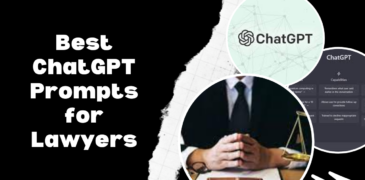Hello dear readers, I’m thrilled to dive into the fascinating intersection of law and technology today. As a tech enthusiast and lawyer, I’m passionate about how technology is reshaping the legal landscape. ChatGPT, an artificial intelligence model developed by OpenAI, is one such technology I’d like to focus on. By simulating human-like text, it serves as a powerful tool for lawyers to tap into.
I’ll be sharing some of the best ChatGPT prompts tailored for lawyers, helping you navigate complex legal terrain and streamline your day-to-day work. Whether you’re drafting legal documents, researching, or brainstorming strategies, this guide will be your handy companion. So sit back, relax, and let’s explore this exciting new frontier together.
As we plunge further into this exciting topic, we’re going to dissect how ChatGPT can be a valuable tool in our legal arsenal. There are several practical applications for lawyers that I’m thrilled to share with you.
Empowering Legal Research and Fact Checking
An attorney’s work is deeply rooted in research. Whether it’s studying legal precedents, grasping the nuances of laws, or staying on top of changes in legislation, legal research can be a demanding task. ChatGPT emerges as an effective ally in this scenario. With carefully crafted prompts, it can provide a snapshot of diverse legal principles, landmark court decisions, or even expansive legal statutes. While it doesn’t replace comprehensive research, it’s a handy tool for getting started.
Consider these prompts as useful examples:
- “Could you explain the principle of ‘Double Jeopardy’?”
- “Provide a summary of the GDPR regulations.”
- “What are the significant points from the ‘Roe v. Wade’ case?”
By using these prompts, you can get a quick summary, refresh your memory, or understand the basic concepts of intricate laws.
Ideating Legal Strategies
When dealing with complex cases, a different perspective can be the key to a breakthrough. ChatGPT may not have years of legal experience, but it can facilitate the exploration of various possibilities by generating an array of legal strategies. You could try something like:
- “Can you brainstorm potential defenses for a breach of contract case where the defendant alleges the contract was unconscionable?”
It might just spark the idea you’ve been searching for.
Assisting in Drafting Legal Documents
The creation of legal documents demands expertise, precision, and considerable patience. Although ChatGPT can’t replace the proficiency of an experienced attorney, it can aid in creating initial drafts or sections of legal documents. These prompts might prove useful:
- “Can you generate a sample ‘Non-Disclosure Agreement’?”
- “Draft the opening paragraph for a motion to dismiss on the grounds of lack of personal jurisdiction.”
Utilizing these prompts can make the drafting process more efficient and less daunting.
Demystifying Legal Jargon
We often find ourselves needing to simplify complex legal situations or jargon for our clients. Here, ChatGPT proves to be a beneficial tool. It can deconstruct legal terminologies into simpler, more understandable language. For example:
- “Explain ‘Probate’ in simple, understandable terms.”
- “Break down the concept of ‘Eminent Domain’ in layman’s terms.”
With these prompts, you can help your clients better understand their situation and the legal actions involved.
Enhancing Training and Quizzing
Regardless of whether you’re a seasoned attorney or an aspiring law student, honing your legal knowledge is essential. ChatGPT can support this process by formulating quiz questions or hypothetical scenarios for practice. For instance:
- “Create a multiple-choice question on ‘Constitutional Law’.”
- “Can you generate a hypothetical scenario for a criminal law case study?”
These prompts can keep your knowledge up-to-date and your problem-solving skills sharp.
Streamlining Daily Task Management
Every lawyer knows the importance of efficiently managing tasks and appointments. With ChatGPT, you can simplify your daily task management. Consider using prompts like:
- “Help me prepare a to-do list for a lawyer working on a personal injury case.”
- “List down steps to effectively organize legal files digitally.”
Such prompts can save you time and help you stay organized, leaving you with more time for the complex tasks that demand your attention.
Also read:
How to Enable and Use Code Interpreter in ChatGPT
How to Use ChatGPT on Android and iOS
How to Draw Graphs, Charts and Diagrams in ChatGPT
How to Save and Share ChatGPT Conversations
FAQs
Can ChatGPT replace a lawyer?
No, ChatGPT cannot replace a lawyer. It’s an artificial intelligence model that can assist lawyers by providing information, generating drafts, brainstorming strategies, etc., based on the prompts given. It’s a tool to enhance a lawyer’s capabilities, not a replacement for their expertise, judgement, or ethical considerations.
Is the information provided by ChatGPT always accurate?
ChatGPT generates responses based on a massive dataset it was trained on, including a broad range of internet text. However, while it attempts to provide accurate information, it may occasionally make mistakes. Therefore, any information obtained should be cross-checked with reliable sources, especially when used in a legal context.
Can ChatGPT be used to draft legally binding contracts or important legal documents?
ChatGPT can help in generating drafts or sections of legal documents, but it’s important to remember that it doesn’t understand context the way a human does. Hence, a lawyer should always review and adjust these drafts as needed. It’s also critical to ensure that any final document complies with applicable laws and fulfills the required legal standards.
Is it ethical for lawyers to use ChatGPT?
Yes, it is ethical for lawyers to use ChatGPT, as long as it’s used responsibly. This means always reviewing the information it provides, never relying on it for critical legal decisions without proper verification, and not using it to provide direct legal advice to clients.
Can ChatGPT keep legal conversations confidential?
As of my knowledge cutoff in September 2021, OpenAI retains data passed into the ChatGPT API for 30 days but does not use it to improve their models. However, for any updates or changes to the data usage policy, you should refer to OpenAI’s privacy policy. Remember, it’s always important to avoid sharing sensitive information when using such tools.
Can ChatGPT help in court proceedings or negotiations?
ChatGPT can provide information, suggest strategies, or help draft speeches or negotiation points, but it can’t interact directly in real-time situations like court proceedings or negotiations. It also doesn’t possess human skills like empathy or emotional intelligence, which are critical in these situations.
How reliable is ChatGPT for legal study or law school?
ChatGPT can be a helpful tool for law students for things like explaining legal concepts, generating hypothetical case studies, or creating practice questions. However, it should be used as a supplementary tool, not a primary source of study. Always cross-check information with textbooks, lectures, and other authoritative sources.
Conclusion
In the fast-paced world of law, AI technologies like ChatGPT can provide invaluable assistance. However, it’s crucial to remember that while ChatGPT is a tool of great potential, it doesn’t replace a lawyer’s judgement or expertise. Always use it to complement your knowledge and skills, not as a substitute.
Embracing AI technology is about more than just staying up-to-date with the latest tools. It’s about reinventing what it means to practice law, moving beyond traditional constraints, and fostering a more vibrant and responsive legal profession.
As lawyers, we’re not just advocates and negotiators; we’re also pioneers exploring the exciting frontiers of legal technology. With tools like ChatGPT at our disposal, the possibilities are endless. So I urge you to explore these prompts and experiment with AI in your practice. You might just be surprised by what you discover.
Until next time, keep asking questions, keep exploring, and keep pushing the boundaries. Because in the legal profession, as in life, it’s the questions that drive us forward.







